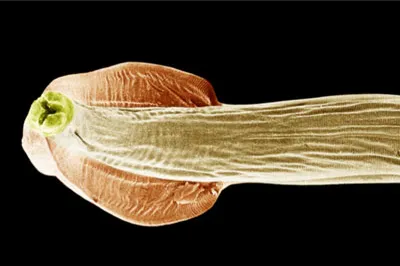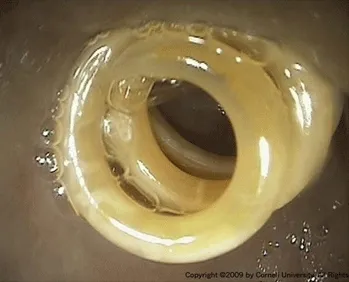Roundworms are an exceptionally common internal parasite, affecting almost every dog at some point in their lives, particularly during puppyhood. These resilient worms, primarily Toxocara canis, are easily spread and can be challenging to eradicate completely. As a responsible pet owner, you might wonder if these common canine parasites pose a risk to your family. The answer is yes, humans can contract roundworms from dogs, making it crucial to understand the transmission routes, symptoms, and most importantly, how to prevent infection in both your beloved pet and yourself. This guide from Dog Care Story will shed light on this important zoonotic concern.
Understanding Canine Roundworms: What Are They and How Do Dogs Get Them?
Toxocara canis is the predominant roundworm species found in dogs. These worms live in the small intestines of infected canines, consuming partially digested food. Their lifecycle is complex, involving several ways dogs can become infected.
Puppies often acquire roundworms from their mothers. This can happen prenatally, meaning the larvae pass from the mother across the placenta to the developing puppies before birth. Additionally, nursing puppies can ingest larvae through their mother’s milk. Beyond direct maternal transmission, dogs of any age can become infected by ingesting embryonated eggs from contaminated environments, such as soil, grass, or even other dogs’ feces. Another less common, but significant, route of infection is through eating “paratenic hosts” – small mammals like mice or rabbits that have roundworm larvae encysted in their tissues. When a dog preys on and consumes such an animal, the larvae are released and can develop into adult worms in the dog’s intestine. This multi-faceted transmission makes roundworms ubiquitous in canine populations.
Recognizing Roundworm Symptoms in Dogs
While many adult dogs with a light roundworm burden may show no obvious signs, heavy infections, especially in puppies, can lead to noticeable health problems. Common symptoms include a distended or “pot-bellied” appearance, dull and rough fur, weight loss despite a good appetite, vomiting, and diarrhea. In some cases, puppies may even vomit up live worms, which appear white or light brown and can be several inches long. If a large number of larvae migrate through the lungs, a dog might develop a cough, sometimes mistaken for kennel cough. Recognizing these signs is crucial for early intervention. For more insights into how internal parasites can affect your dog’s digestion, you might find it helpful to read about other digestive issues: can worms cause upset stomach in dogs.
Preventing and Treating Roundworms in Your Dog
Effective prevention and treatment strategies are vital for managing roundworms in dogs. Due to the high risk of maternal transmission, puppies should begin deworming protocols early, typically at 2, 4, 6, and 8 weeks of age, followed by monthly preventative treatments. Nursing mothers should also be dewormed concurrently with their puppies to minimize the risk of transmission. Regular fecal examinations, usually 2 to 4 times during the first year of a dog’s life and annually thereafter, help detect infections.
Environmental hygiene plays a critical role in prevention. Promptly removing and disposing of dog feces from your yard and public areas prevents the embryonated eggs from contaminating the soil. Limiting your dog’s access to wild animals and preventing them from scavenging can also reduce exposure to paratenic hosts. Many broad-spectrum heartworm preventatives include ingredients that also control roundworms, offering a convenient way to manage multiple parasites. Always consult your veterinarian to determine the most appropriate deworming schedule and preventative medications tailored to your dog’s specific needs and lifestyle. Sometimes, dealing with persistent parasitic infections requires specific approaches, much like when a puppy can’t get rid of giardia.
 Microscopic view of *Toxocara canis* anterior end, showing characteristic alae (wing-like extensions)
Microscopic view of *Toxocara canis* anterior end, showing characteristic alae (wing-like extensions)
The Critical Question: Can Humans Contract Roundworms from Dogs?
This is where the discussion of canine roundworms takes on a significant public health dimension. Yes, humans can indeed contract roundworms from dogs, a condition known as zoonotic transmission. While adult roundworms cannot mature and reproduce in human intestines, the migrating larvae can cause serious health issues. The primary route of human infection is through the accidental ingestion of embryonated Toxocara eggs found in contaminated soil or dog feces. These eggs are incredibly resilient and can survive in the environment for months or even years.
Once ingested by a human, the Toxocara eggs hatch in the intestines, and the larvae migrate through various tissues and organs, causing conditions known as Visceral Larva Migrans (VLM) or Ocular Larva Migrans (OLM). VLM occurs when the larvae migrate through internal organs like the liver, lungs, heart, or brain, leading to symptoms such as fever, cough, abdominal pain, and enlarged organs. OLM occurs when larvae migrate to the eye, potentially causing vision loss, strabismus (crossed eyes), or even permanent blindness in the affected eye. Children are particularly vulnerable due to their tendency to play in soil, where eggs accumulate, and their less developed hygiene practices, often putting contaminated hands into their mouths. Understanding this risk is paramount for pet owners, and further details on this specific transmission are available at: can roundworms in dogs be passed to humans.
Protecting Your Family: Preventing Human Roundworm Infection
Preventing human infection with canine roundworms revolves around strict hygiene and responsible pet ownership. Given that contaminated soil is a major source of infection, teaching children about proper handwashing after playing outdoors, especially in sandboxes or dirt areas, is critical. Always supervise children when they are playing in environments where pets might defecate. Adults should also practice good hygiene, such as wearing gloves when gardening or handling soil, and always washing hands thoroughly after cleaning up pet waste.
Regular deworming of your dog, as recommended by your veterinarian, is one of the most effective ways to reduce environmental contamination with Toxocara eggs, thereby minimizing the risk to humans. Prompt and proper disposal of all dog feces is equally important; this means bagging and discarding it immediately rather than leaving it in the yard. By implementing these preventive measures, you can significantly reduce the risk of roundworm transmission to yourself and your family. Staying informed about various parasites and their potential for human transmission, such as understanding if can you get lice from a dog, helps maintain a healthy home environment.
 Close-up image of a living adult roundworm (Ascarid) within an animal's intestine
Close-up image of a living adult roundworm (Ascarid) within an animal's intestine
Conclusion
Roundworms are a common and widespread concern for dog owners, but their impact extends beyond canine health. The zoonotic potential of Toxocara canis means that human ingestion of embryonated eggs, especially by children, can lead to serious conditions like Visceral and Ocular Larva Migrans. By diligently following veterinarian-recommended deworming protocols for your pets, practicing excellent environmental hygiene, and reinforcing strict handwashing habits for all family members, you can effectively safeguard both your dog’s health and your family’s well-being from these pervasive parasites. Prioritizing preventive care and staying informed are your best defenses against roundworms. Explore more expert advice on pet care and parasite prevention at Dog Care Story to keep your furry friends and family healthy and happy.
